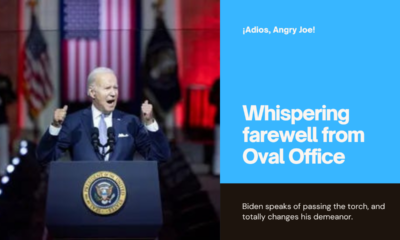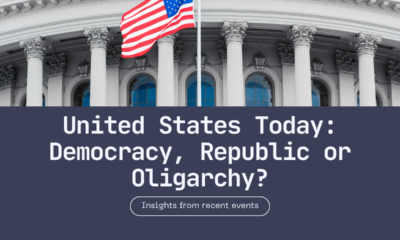Christianity Today
Supreme Court repudiates Blaine
The Supreme Court, in Carson v. Makin, thoroughly repudiates the no-State-support-of-religion amendments by James G. Blaine.
The Supreme Court released five more opinions yesterday. One of them, Carson v. Makin, will no doubt become a landmark. That case, while it builds on several previous cases, does break new ground in clarifying the Establishment Clause of the First Amendment. With its decision in Carson, the Supreme Court reverses a 147-year wrongheaded course. The atheists, beginning with President Ulysses S. Grant and Rep. James G. Blaine (R-Maine), have lost the Establishment Clause.
Supreme Court update: key decisions still outstanding
The Supreme Court this morning posted a third Opinion Issuance Day for Friday, June 24. The five opinions the Court released yesterday did not include one in Dobbs v. Jackson Women’s Health Organization. So that case is one of thirteen cases left for the Court to decide. Other key cases waiting for decision include:
New York State Rifle and Pistol Association v. Bruen. That case will decide whether or not New York State may refuse concealed-carry permits in typical cases.
Kennedy v. Bremerton School District. Coach Kennedy lost his job because he prayed with players after games. Naturally he wants his job back, and if he gets it, that will further move the cause of religious liberty.
Biden v. Texas, concerning whether President Biden had the authority to rescind President Trump’s “Remain in Mexico” policy.
West Virginia v. Environmental Protection Agency, on whether or not the EPA may regulate carbon dioxide as a pollutant.
In compiling this list, CNAV tips its hat to Rolling Stone, which provided all these links in its article about the Carson case. As Sun Tzu would no doubt agree, even one’s enemies may provide valuable intelligence on occasion. (And sometimes you don’t even have to spy on him to get it.)
The Supreme Court could issue all thirteen opinions over the next two days. Or they could issue all but three to five of them, and issue those next week.
The Carson case
The reportage on the Carson case comes from, among others, New York magazine, Rolling Stone (as noted), CNN, and NPR. We also have commentary from Erick-Woods Erickson, the “Political Junkie” of Atlanta. Better than that, we have the opinion itself.
David and Amy Carson, and Troy and Angela Nelson, live in two different towns in Maine. The State of Maine, which Chief Justice Roberts called “the most rural State in the Union,” has a problem. Like every State, Maine has a constitutional requirement that towns and counties provide free public schools to their residents. But the sparse settlement and long travel distances make this next to impossible. Main has 260 School Administrative Units (SAUs). All provide elementary schools. But fewer than half can afford to provide secondary schools. The towns of Glenburn and Palermo, where the Carsons and the Nelsons live, do not have that favor. Some SAUs can contract with their neighbors to have their secondary-school-age students go to the neighboring middle and high schools. But Glenburn and Palermo can’t even afford that – and their problems are typical.
So the legislature, long ago, set up mandates and funding for tuition assistance for parents who live in such SAUs. (Vermont does the same.) Thus Glenburn and Palermo, and other communities like them, can pay the tuition at the public or “approved” private school of a parent’s choice. The problem: in 1981, Maine passed a law that only nonsectarian schools could get approval for tuition assistance under this program.
Historical background – and sad Supreme Court precedent
The roots of that law go back to 1875, and a thoroughly atheistic plan by President Grant and Representative Blaine. Before that year, many States had close ties to churches. All that the First Amendment forbade was the establishment of a “Church of America.” In addition, the Constitution (Article VI) denied any authority to impose a “religious test” for holding office.
But this did not satisfy President Grant. So he sought to amend the Constitution to fund free federal public schools – and refuse to fund religious schools. Representative Blaine introduced this proposed amendment in the House. It passed – but failed by four votes in the Senate.
Why did they so act? Erickson tells us that Grant and Blaine sought to slow the immigration of Irish and other Catholics into the country. A system of government atheistic schools was to be their means of stopping that inflow.
When the Senate refused to send that amendment to the States, Blaine traveled the country and persuaded most States to so amend their own Constitutions. (Thirty-seven States have “Blaine Amendments” today, but oddly, Maine is not one of them.) For this reason, New York features a photo of Blaine and calls him:
Maine’s, and America’s, great champion of church-state separation.
But when they try to suggest that Blaine was merely copying Jefferson, they clearly get it wrong. Again, James Madison intended, with the Establishment Clause, to forbid a “Church of America,” with salaries for its clergy and laws forbidding anyone to worship anywhere else.
Favoring atheists
Instead, the Supreme Court, beginning at least with Everson v. Board of Ed. of Ewing (1947), took the position that absolutely any funding of any institution having a religious character constituted an “establishment of religion.” That would have been news to Jefferson, and even to Grant and Blaine. Look again at the text of the amendment Blaine tried to get Congress to propose:
No State shall make any law respecting an establishment of religion, or prohibiting the free exercise thereof; and no money raised by taxation in any State for the support of public schools, or derived from any public fund therefor, nor any public lands devoted thereto, shall ever be under the control of any religious sect; nor shall any money so raised or lands so devoted be divided between religious sects or denominations.
Now if “establishment of religion” really meant to include funding of religious schools, why mention that separately? Blaine knew what he was doing, and that language was not in any way redundant.
Over the decades, the Supreme Court declared hostility to religion. In essence the Supreme Court has made case law respecting an establishment of atheism or secular humanism as official anti-religion. CNAV argues that these precedents really underlay Roe v. Wade.
Such is the background of the Maine law. The Carsons and Nelsons decided to sue it away. The Court of Appeals for the First Circuit found for Maine. But yesterday the Supreme Court reversed that judgment.
The Supreme Court starts to walk it back
Chief Justice Roberts charts how the Supreme Court has started to walk back this hostility toward religion. In Zelman v. Simmons-Harris (2002), the Court specifically held:
a benefit program under which private citizens “direct government aid to religious schools wholly as a result of their own genuine and independent private choice” does not offend the Establishment Clause.
Shortly after the Zelman case, Maine’s Legislature considered repealing its “nonsectarian” requirement. That proposal failed.
But in 2017 the Supreme Court, in Trinity Lutheran Church of Columbia, Inc. v. Comer, held that no State may deny funding, otherwise available to others, merely because the applicant was a church. At issue was a Missouri law that provided grants for resurfacing playgrounds with cushioning surfaces from recycled auto tires.
Then, in 2020, while the Carsons and Nelsons were appealing to the First Circuit, the Court made another related ruling. In Espinoza v. Montana Department of Revenue, the Court directly held that Montana’s Blaine Amendment is unconstitutional. At issue in Espinoza was a scholarship program available only to students at nonsectarian schools.(Missouri has a Blaine Amendment also, and the Court’s action in Trinity Lutheran certainly looks like a strike against it.)
And in the 2021 term, the Supreme Court held in Shurtleff v. Boston that the City of Boston could not refuse to let a religious organization fly its flag in front of City Hall.
Carsons and Nelsons win; Blaine loses
Accordingly, in the Carson case, the Supreme Court held that Maine, having decided to provide tuition assistance, may not refuse it to religious parents. Maine does not have a Blaine Amendment, but it does have that 1981 law. The only reason for that law was an opinion by Maine’s then Attorney General that the Establishment Clause required it. NO, the Supreme Court said yesterday. Not only that, but to refuse the funding violates the Free Exercise Clause. So Roberts inferred from the Zelman case, and the Conservative Five (Alito, Barrett, Gorsuch, Kavanaugh, and Thomas) agreed with him.
The Maine Commissioner of Education tried to argue that his case was different from the Trinity and Espinoza cases. His theory: the instruction the two religious schools offer, clearly includes encouraging non-believers to believe. So Commissioner Makin invoked another case, Locke v. Davey, where the Court did disallow tuition assistance for a religious school. But that particular school offered a program to prepare students to go to seminary. That doesn’t apply to the Carsons or the Nelsons.
Finally, Roberts reminded the Maine Department of Education that they could avoid the issue by not providing tuition assistance. They could instead:
- Provide funding to build more middle and high schools,
- Build a bigger bus fleet,
- Provide tutoring, remote learning, “partial attendance,” or some combination of these, or even
- Build and operate State boarding schools.
But having decided to assist with tuition, they must make that assistance available for all schools, secular or not.
The breathless dissents …
As above, Alito, Barrett, Gorsuch, Kavanaugh, and Thomas agreed with Chief Justice Roberts. But Breyer, Kagan, and Sotomayor most emphatically did not. Neither did New York or Rolling Stone. (CNN and, to a lesser extent, NPR kept their reporting neutral.)
Breyer, aghast at the apparent effrontery of the majority, stood on the Everson and other religion-hostile precedents. He invoked the non-legal phrase “play in the joints” to describe how to satisfy the Establishment and Free Exercise Clauses. But mostly he argued that the Establishment Clause existed to prevent “anguish, hardship and bitter strife” from sectarian warfare.
But Breyer argued, not from the Constitution, nor even from any notes by Madison or Jefferson. Instead he argued purely from Supreme Court precedent post-Blaine. When he did that, he evidently refused to recognize that there’s a new Sheriff in town (or an old One).
Breyer’s own “views” of how to interpret the “Religion Clauses” to avoid “religious strife” is of no moment. The only strife this country has seen, is between the faithful and the atheists. Beginning with Blaine, the atheists have had the upper hand. Breyer might be copacetic with that, but he cannot justify such a position with flawed case law. One cannot avoid strife forever with lies.
Sotomayor continues the error. Furthermore, she tries to distinguish between Carson on one hand, and Zelman, Trinity and Espinoza on the other. But she may not do that! In point of fact, she regards Zelman as equally erroneous and threatening to secular liberty.
… and equally breathless editorials
New York magazine, as above, illustrates its article with a James G. Blaine portrait. Furthermore, they lament that Montana’s Blaine Amendment clearly fell in Espinoza. (The Federalist Society noted that the Trinity Lutheran decision did the same to Missouri’s Blaine Amendment.) But at the end, they write:
Blaine (and likely Jefferson) is likely rolling in his grave.
Blaine certainly is, but not Jefferson. Again, Jefferson intended to protect churches from having to curry favor from the government. Nothing in his writings suggests that he would have the government explicitly teach and favor atheism, as Blaine did.
Rolling Stone goes completely off the rails, but that’s of a piece with their editorial stance. Six years ago, they called explicitly for a repeal of the Second Amendment. In that call they displayed all the magical thinking that typifies the Left. In this case it calls for working some kind of magic to remove all guns, except those in possession of:
- Law-enforcement officers,
- Active-duty military,
- Very Important Persons, and
- Their bodyguards.
Today they express horror that the Supreme Court, in the New York gun club case, will let people carry guns in New York. They express further horror that the Court will let coaches pray with their teams, tell immigrant visa applicants to wait outside our borders, and tell the EPA to go pound sand with their power-curtailing regulations.
Drawing the moral from this Supreme Court decision
Yesterday the Supreme Court spoke with a loud majority voice. The Framers of the Constitution never sought to build an atheistic or secular country. Those who suggest that they did, should remember John Adams saying our Constitution was for “a moral and religious people.”
Twelve States never added Blaine Amendments to their Constitutions. They are: Arkansas, Connecticut, Iowa, Maine, Maryland, New Jersey, North Carolina, Ohio, Rhode Island, Tennessee, Vermont, and West Virginia. Louisiana did pass a Blaine Amendment in 1921 but repealed it in 1974.
In line with making America a civilizational state, CNAV urges a mass movement to repeal all remaining Blaine Amendments. The Supreme Court, in Carson, as good as said all Blaine Amendments violate the federal Constitution. (You Texans hoping to create a secession study committee, take note! You might want to scuttle your Blaine Amendment as part of turning Texas back into a Republic.)
The hostility to religion on the part of federal and State governments must end. This case has highlighted one necessary way to bring it to an end.
What will Maine do? Will they throw up their hands and cancel all tuition assistance? Or will they repeal their 1981 Blaine Law? Their legislature will not reconvene until September – or will the Governor call a special session? Stay tuned.
Terry A. Hurlbut has been a student of politics, philosophy, and science for more than 35 years. He is a graduate of Yale College and has served as a physician-level laboratory administrator in a 250-bed community hospital. He also is a serious student of the Bible, is conversant in its two primary original languages, and has followed the creation-science movement closely since 1993.
-

 Executive4 days ago
Executive4 days agoSecret Service chief gets no solace
-

 Executive3 days ago
Executive3 days agoWaste of the Day: Louisville Taxpayers Pay Nearly $600,000 For Empty Building’s Maintenance, Security
-

 Guest Columns4 days ago
Guest Columns4 days agoFear Itself: Democrats’ Favorite Strategy Caused Their Current Chaos
-

 Executive3 days ago
Executive3 days agoWhere is Joe Biden – or Jill?
-

 Executive1 day ago
Executive1 day agoWaste of the Day: Throwback Thursday: Cities Used Crime Prevention Funds on Soccer Games, Paper Shredding
-

 Executive2 days ago
Executive2 days agoFacile and politically motivated suggestions
-

 Civilization5 days ago
Civilization5 days agoBuild Iron Dome in the United States To Prepare for Israel’s Worst Day
-

 Executive1 day ago
Executive1 day agoBiden makes farewell whisper











And remember the ruling was 6 to 1. We only have 7 actual Supreme Court Justices on the US Supreme Court. Sotomayor and Kagan are not legitimate Constitutionally Supreme Court Justices since Mr Obama was never actually President. He fails both Citizenship requirements. He was not even alive when the US Constitution was adopted and he is not a natural born Citizen of the US – that is born in the US of a US citizen father and US citizen mother.
[…] come from this article in Rolling Stone, critical of a case the Court released earlier this week. (Carson v. Makin, 20-1088). Aside from Kennedy, we really don’t know how the Court will rule. Brett Kavanaugh is a […]
[…] Thomas did draw five of his colleagues to join him in repudiating the Blaine Regime. (Carson v. Makin.) But fully repairing the damage of those 147 years might take […]
[…] to propose a specific Amendment to force the States to disestablish their religions. See our discussion of the Carson […]
[…] separation of church and state) that she held forth in her dissent in another case from this term, Carson v. Makin. Indeed every word of her dissent, beyond misrepresenting the case record, reeks of contempt for […]
[…] Ewing (1947), forbidding government aid to any religious institution because it was religious. (See here for further discussion of that […]
[…] S. Grant, who put him up to it. CNAV has covered the sorry history of Blaine and his Amendments before. The Supreme Court has, of course, repudiated Blaine with its decision in Carson v. Makin. And it […]
[…] all our nation was founded on the principle that God alone is responsible for our rights. If the name God makes you feel queasy then call it nature. But under no circumstances must we […]
[…] does not hold promise. James G. Blaine, don’t forget, persuaded up to thirty-eight States to pass anti-religious amendments to their own Constitutions. (Louisiana repealed theirs in 1974.) The Supreme Court itself gave us a […]
[…] And therein lies the real problem. A John Adams could have told them what difference it made. But since 1875 America has followed the precepts, not of John Adams, but of James G. Blaine. […]
[…] Carson v. Makin (20-1088), which thoroughly repudiated all Blaine Amendments and Blaine Laws as unconstitutional on their face, […]
[…] Carson v. Makin (20-1088). […]
[…] the Supreme Court, in Carson v. Makin, repudiated that stance. At issue was not a State constitutional amendment, but a State law to that […]